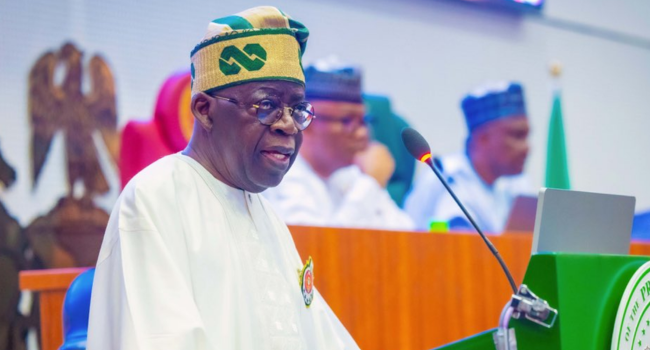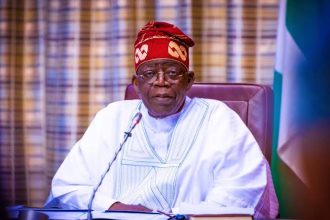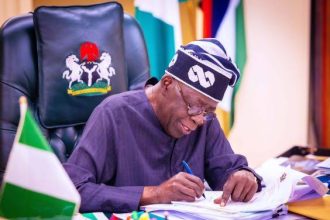- Achieving a 7% GDP growth rate is a significant economic target.
- Tinubu's plan involves strategic investments and economic reforms.
- The plan aims to reshape Nigeria's economic future.
- The success of this plan depends on various economic factors.
- Understanding the implications of this growth target is crucial.
Nigeria’s economy is set for a big change. The government has a new plan to reach a 7% GDP growth rate by 2027. This could change the country’s economic future.
Looking into Tinubu’s economic plan, we see it’s more than just a goal. It’s a dream for a wealthier Nigeria. The plan focuses on lasting growth and smart investments.
We’ll look into the details of this plan. We’ll see the strategies and policies to hit the GDP growth target 2027. This includes economic reforms, investment chances, and the challenges ahead.
The Bold Economic Vision for Nigeria
Nigeria’s President Tinubu has set a bold goal for the economy. He aims for a 7% GDP growth rate by 2027. This plan is to boost the economy and better the lives of Nigerians.
Announcement of the Growth Target
The 7% GDP growth target by 2027 is a big step for Nigeria. It’s more than just a number. It’s a promise to create jobs, reduce poverty, and offer more economic chances.
Key Points of the Economic Roadmap
The economic roadmap has several key strategies. It includes investing in infrastructure, improving the agricultural sector, and boosting manufacturing. These plans aim to work together to reach the 7% GDP growth goal.
| Economic Sector | Key Initiatives | Expected Outcomes |
|---|---|---|
| Infrastructure | Investments in roads, bridges, and transportation systems | Improved connectivity and reduced transportation costs |
| Agriculture | Reforms to enhance productivity and output | Increased food security and export earnings |
| Manufacturing | Initiatives to boost production and competitiveness | Job creation and increased contribution to GDP |
Why This Target Matters for Nigerians
A 7% GDP growth rate by 2027 is key for Nigerians. It promises better economic chances, more jobs, and a higher standard of living. Success depends on good planning and everyone’s effort.
Current State of Nigeria’s Economy
Nigeria’s economy is shaped by many factors. These include both internal and external elements that affect its growth.
Present GDP Growth Rate and Trends
Nigeria’s GDP growth rate has seen ups and downs. It’s still recovering from the pandemic’s effects. The current rate is about 3%, up from last year but still not as high as before the pandemic.
Economic Challenges Facing the Nation
Nigeria faces many economic hurdles. High inflation and rising unemployment are major concerns. These issues affect the cost of living for many people.
Post-Pandemic Recovery Status
Inflation and Cost of Living Crisis
Inflation is a big worry, with the cost of living rising. The inflation rate is around 18%. This puts a strain on household budgets.
Unemployment Figures
Unemployment is also a major problem, with a rate of about 33%. This has big implications for economic growth and stability.
| Economic Indicator | Current Rate |
|---|---|
| GDP Growth Rate | 3% |
| Inflation Rate | 18% |
| Unemployment Rate | 33% |
These indicators show the tough challenges Nigeria’s economy faces. Overcoming these will be key to achieving stable and sustainable growth.
Tinubu’s Target of 7% GDP Growth by 2027: Breaking Down the Plan
Nigeria is set for big economic growth under Tinubu’s plan. He aims for a 7% GDP growth rate by 2027. This goal is part of a detailed economic strategy focusing on several key areas.
Core Economic Strategies
Tinubu’s plan centers on diversifying the economy, improving the business climate, and investing in key infrastructure. Nigeria wants to move away from oil and gas to build a stronger economy. This will help it handle global market changes better.
He plans to boost agricultural transformation and manufacturing development. These sectors will drive growth and create jobs. They are key for lasting economic growth.
Projected Milestones
The path to 7% GDP growth by 2027 includes several milestones. These are:
- Increasing the agricultural sector’s GDP contribution
- Boosting manufacturing output
- Improving the ease of doing business
Comparison with Previous Administrations’ Goals
Tinubu’s plan is more ambitious than past ones. It focuses on diversifying the economy and investing in people. Past plans aimed at growth but lacked this detailed approach.
Timeline for Implementation
The plan has a clear timeline for implementation. It has short-term, medium-term, and long-term goals. This ensures a step-by-step approach to reach the 7% GDP growth target.
By 2025, the focus will be on setting up the foundation through infrastructure and policy changes. By 2027, the goal is to see major progress in all areas, hitting the GDP growth target.
Key Sectors Driving the Growth Agenda
The Tinubu administration has picked key sectors for Nigeria’s economic growth. These include oil and gas, agriculture, technology, and manufacturing. They are key to reaching the goal of 7% GDP growth by 2027.
Oil and Gas Reforms
The oil and gas sector is a big part of Nigeria’s economy. Reforms aim to boost efficiency and increase revenue.
Petroleum Industry Act Implementation
The Petroleum Industry Act is a big part of these reforms. It’s expected to bring more transparency and accountability to the sector.
Agricultural Transformation
Agriculture is also a vital sector being transformed. This includes modernizing irrigation systems and helping farmers get finance and technology.
Technology and Digital Economy
The technology and digital economy are becoming major growth drivers. Efforts are being made to improve digital literacy and infrastructure.
Manufacturing and Industrial Development
Manufacturing and industrial development are being promoted. This is through policies to improve the business environment and attract investment.
These sectors work together to form a comprehensive growth strategy. The success of these efforts is crucial for reaching the 7% GDP growth target.
Infrastructure Development as a Growth Catalyst
Nigeria aims for a 7% GDP growth by 2027. Infrastructure development is key to this goal. A strong infrastructure is essential for a thriving economy. It helps businesses run smoothly and improves life for citizens.
Transportation Networks
Our transportation networks are changing a lot. We’re investing in rail and road projects to connect the country better.
Rail Projects and Road Expansion
Rail development cuts costs and time for moving goods and people. For example, the Lagos-Calabar rail project boosts coastal connectivity.
Power Sector Reforms
Power sector reforms are vital. We aim to stabilize the grid and boost electricity generation. This includes both short-term and long-term plans for reliable power.
Water and Sanitation Projects
Water and sanitation projects are key for economic growth and health. We’re investing to improve access to clean water and sanitation. This will boost productivity and well-being.
| Infrastructure Project | Status | Impact |
|---|---|---|
| Lagos-Calabar Rail | Ongoing | Improved coastal connectivity |
| Power Grid Stabilization | In Progress | Reliable power supply |
| Water Sanitation Initiatives | Planned | Improved public health |
Financial and Monetary Policy Reforms
We aim for a 7% GDP growth rate by 2027. Financial and monetary policy reforms are key. Our team is working hard to strengthen the banking sector, improve exchange rates, and control inflation.
Banking Sector Strengthening
We aim to make our banking sector more stable. We will use robust regulatory frameworks and improved supervision. Our goal is to help banks offer affordable credit to key sectors, boosting economic growth.
Exchange Rate Policies
A stable exchange rate is essential for attracting foreign investment and boosting trade. Our exchange rate policies will aim for stability while keeping us competitive globally.
Inflation Management Strategies
Keeping inflation under control is crucial for Nigerians’ purchasing power. We will introduce monetary policy reforms to balance growth and price stability. This ensures our GDP growth plan isn’t hurt by inflation.
Central Bank’s Role in the Growth Plan
The Central Bank is crucial in our economic growth plan. They will implement monetary policy reforms to support our GDP growth strategy. They will work with other financial institutions to make sure our economic policies are carried out effectively.

Job Creation and Human Capital Development
Tinubu’s economic plan for Nigeria aims to create jobs and develop human capital. These are key for lasting economic growth. We will look at how to achieve this.
Employment Generation Targets
Tinubu wants Nigeria’s GDP to grow by 7% by 2027. To do this, he has set high job creation targets. We aim to create jobs in agriculture, technology, and manufacturing.
Skills Development Initiatives
Improving skills is vital for human capital development. We’re starting various programs to boost vocational training and education. This will help Nigerians compete globally.
Education System Reforms
Our education system needs a makeover to meet today’s job market needs. We’re working to make education better and more relevant to the economy.
Youth Empowerment Programs
Our youth empowerment programs are crucial for human capital development. We’re launching initiatives to train, mentor, and support young Nigerians. This will help them contribute to the economy.
By focusing on job creation and human capital, Nigeria can grow sustainably. This will also improve the lives of its citizens.
Addressing Structural Challenges to Growth
To hit the goal of 7% GDP growth by 2027, Nigeria must face its deep-seated issues. The economy is held back by security worries, corruption, and poor governance.
Security Concerns and Economic Impact
Security issues in Nigeria hurt the economy a lot. Problems in different areas make it hard for businesses to operate. For example, farming is tough in the north because of banditry and kidnapping.
Oil-producing areas also face big challenges. Vandalism and militancy are major problems.
Corruption and Governance Issues
Corruption is a big block to Nigeria’s economic growth. It makes it hard for businesses to thrive and scares off foreign investors. It also takes away money meant for public services.
Bad governance, like slow bureaucracy and lack of transparency, makes things worse.
Regulatory Environment Improvements
Improving the rules for businesses is key to attracting investors and growing the economy. This means making it easier to start a business and enforcing contracts fairly.
Ease of Doing Business Reforms
Reforms to make doing business easier are important. These efforts aim to simplify rules, cut down on red tape, and improve the business climate.
| Reform Area | Pre-Reform Status | Post-Reform Status |
|---|---|---|
| Business Registration | Complex, multi-step process | Simplified online registration |
| Contract Enforcement | Lack of transparency, slow courts | Improved court efficiency, alternative dispute resolution |
| Tax Compliance | Multiple taxes, complex compliance | Simplified tax regime, online compliance |
By tackling these challenges, Nigeria can make its economy more welcoming to growth. It can attract more investment and reach its GDP targets.
International Partnerships and Foreign Investment
Tinubu’s plan for Nigeria’s economy relies on global alliances and foreign investment. He aims for a 7% GDP growth. Nigeria is working on strengthening its partnerships and making it easier for foreign investors.
Strategic Global Alliances
Nigeria is looking to form strong alliances with global leaders. These alliances help access new technologies, markets, and investments. Key areas include:
- Improving bilateral trade agreements with major economies
- Joining international economic forums to showcase Nigeria’s investment potential
- Working with global institutions to upgrade economic infrastructure
Foreign Direct Investment Targets
Attracting foreign direct investment (FDI) is key for Nigeria’s economy. The government aims to increase FDI in areas like:
- Renewable energy
- Agricultural technology
- Manufacturing and industrial growth
To meet these goals, Nigeria is making the business environment better. This includes easier regulations and incentives for foreign investors.
International Trade Agreements
Nigeria is also improving its international trade agreements. This includes:
- Starting new trade agreements with emerging markets
- Updating existing agreements to include digital trade
- Joining regional trade efforts under ECOWAS

By focusing on these areas, Nigeria hopes to attract more foreign investment. It also aims to grow its role in the global economy, driving its economic growth.
Expert Analysis and Economic Projections
Nigeria aims for a 7% GDP growth by 2027. Experts are discussing if this goal is realistic. The Tinubu administration’s economic plans are under close scrutiny.
Economist Perspectives
Economists say Nigeria’s growth depends on good structural reforms. “A strong economic plan needs policies against corruption and better business conditions,” an economist notes.
World Bank and IMF Assessments
The World Bank and IMF are cautiously hopeful about Nigeria’s economy. “Nigeria can see big economic growth if it tackles its structural issues,” an IMF report states.
Local Business Community Reactions
Local businesses support the government’s growth plans. But they stress the need for a better business climate.
“We back the government’s economic reforms, but we need to see real progress,”
shared a local business leader.
Public Opinion on the Growth Target
Public views are divided. Some Nigerians are hopeful about better economic chances. Others doubt the government’s ability to meet its goals. A survey showed that 55% of Nigerians think the government can hit 7% GDP growth by 2027. But 45% are less confident.
Comparing Nigeria’s Growth Plan with Regional Economies
Nigeria wants to grow its economy by 7% by 2027. It’s important to see how this plan compares to other African countries. This will help us find out what Nigeria can do better.
Benchmarking Against Other African Nations
Nigeria’s economic plan can be compared to big African economies. For example, Ghana and Kenya have seen a lot of growth lately.
| Country | 2022 GDP Growth Rate | 2027 Projected Growth Rate |
|---|---|---|
| Nigeria | 3.5% | 7% |
| Ghana | 4.2% | 6.5% |
| Kenya | 5.1% | 6% |
ECOWAS Economic Integration
Nigeria’s growth is linked to the ECOWAS region. Its trade and economic plans are shaped by being part of ECOWAS.
Lessons from Successful Growth Stories
Rwanda and Côte d’Ivoire have grown a lot by investing in infrastructure and people. Nigeria can learn from their success.
The Path Forward: Realizing Nigeria’s Economic Potential
Reaching Tinubu’s goal of 7% GDP growth by 2027 is key for Nigeria’s economy. We’ve talked about many strategies, like improving infrastructure and changing financial policies. These steps aim to boost growth and unlock Nigeria’s huge potential.
To reach this goal, we need to focus on important areas like oil and gas, agriculture, tech, and manufacturing. By using these strategies and hitting our targets, Nigeria can beat its current challenges. This will make it easier for businesses to thrive.
Success also relies on good partnerships with other countries and more foreign investment. By building strong global ties and attracting more investors, Nigeria can grow faster. This will also make it more competitive on the world stage.
As we go forward, keeping an eye on our progress and solving problems is crucial. With a solid plan and everyone working together, we can hit Tinubu’s 7% GDP growth target. This will lead to a brighter future for Nigeria’s economy.













https://t.me/battle_games_com_bot/start?startapp=frndId1891914791